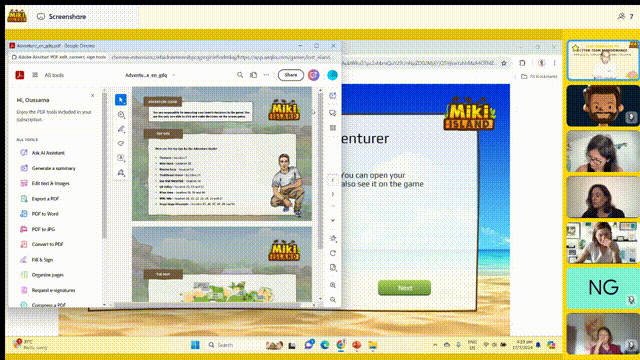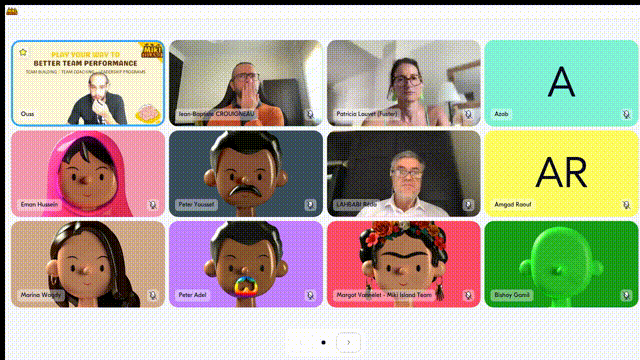Learning Outcomes
Unlock your team’s potential with Miki Island’s focused learning outcomes, designed to elevate performance and drive success.

Building High Performing Teams
Building high-performing teams is at the heart of Miki Island. The simulation is designed to transform individual contributors into cohesive units that excel together. Participants will develop strategies for effective teamwork, establish trust and psychological safety, clarify roles and responsibilities, master open and transparent communication, and align their efforts with a shared vision and goals.
Teams will navigate the four stages of team development, ultimately achieving a high-performance state where they can thrive and adapt in any environment.


Certification Program for Coaches
Future fit your brand and generate new revenue with an innovative learning solution by adding Miki Island to your portfolio of learning solutions for your own clients!
the 10 characteristics of high Performing Teams
Some people think focusing on team development is a waste of time, but it does make a difference to the bottom line. Research studies have identified 10 key characteristics of high performing teams that each team members should pay attention to in order to ensure group productivity:

Goals

Rules

Interdependence

Implementation

Norms

Leadership

Communication

decision making

structure

cooperation
Ready to try Miki Island?
Secure your spot in our next demo workshop!
For team members: Effective team membership

Effective teamwork hinges on each member’s ability to contribute meaningfully to collective goals. At Miki Island, we empower team members to excel by mastering essential skills and fostering a collaborative mindset.
- Learn about group development. When you understand the stages of team development, you become a better team member.
- Be patient. Team development takes time! Your team will not function effectively from the beginning, and that’s ok.
- Expect things to be murky at the beginning. Things are never clear at the beginning of a group.
- Expect conflict. Most people avoid conflict, but conflict in groups is a normal, natural, and a necessary part of group life. Treat is as a positive sign of development and progress.
- Help to limit conflicts to questions related to tasks, roles or structures. This means not getting involved in personal feuds or personality conflicts as this will only negatively impact the psychological safety of the group.
- Be present. You should take responsibility for what is happening in your team, even if it does not directly involve you!
- Be supportive of other members and the leader.
- Be accountable and complete your tasks in a timely fashion. Failure to do so will only slow down the group’s progress.
- Show up. Consistently. Unstable membership will slow group development.
For Leaders: Effective Team Leadership
Leaders don’t need to be extraordinary people with an abundance of skills; rather, an average person with good intentions, flexibility, and a willingness to learn some basic skills can be an effective leader. However, their effectiveness isn’t guaranteed in every context, as they must be selective when accepting leadership roles.
Leadership style should be adapted to meet the developmental needs of the group at any given time.
At stage one, you need to be directive and confident:
- Reduce members’ anxiety and fears of rejection
- Focus on creating a psychologically safe environment
- Provide positive feedback
- Facilitate open discussion of goals, values, and tasks
- Help members feel competent and provide guidance
- Set high performance standards
During stage two, you can start to slowly empowers others within the group to participate more with a focus on facilitating open discussion and resolution of conflicts regarding values, goals, and leadership.
At stage three, the dynamic will shift towards shared leadership. You should encourage other team members to take more responsibility for the leadership of the group. This is also where you can encourage the group to suggest changes in connection to the structure to facilitate group performance.
At stage four, you can now fully delegate to team members and become an expert member of the team. You should still continue to monitor the team process, conduct retrospectives and reviews and maintain a high standard of excellence.

Broadening Horizons
Miki Island's Learning Outcomes Beyond Team Dynamics
Beyond fostering high-performing teams, Miki Island provides a wide range of opportunities for team and leadership development.
Agile Ways of Working
Agile Ways of Working
Embracing agility in thinking and action to foster innovation and adaptability within teams.
Strategy & Tactics
Strategy & Tactics
Equipping leaders with strategic thinking and practical execution skills to achieve organizational goals.
Effective Communication
Effective Communication
Enhancing interpersonal skills and communication strategies to foster clarity and collaboration within teams.
Situational Leadership
Situational Leadership
Developing the ability to adapt leadership styles to suit different situations and team dynamics effectively.
Change Management
Change Management
Providing frameworks and tools to navigate organizational change smoothly and effectively.
Emotional Intelligence
Emotional Intelligence
Cultivating self-awareness and empathy to enhance personal and team effectiveness.
Resilience
Resilience
Building resilience and fostering a culture of compassion and support within teams.
Mutual Accountability
Mutual Accountability
Promoting a culture of responsibility and trust where team members hold each other accountable for collective goals.

